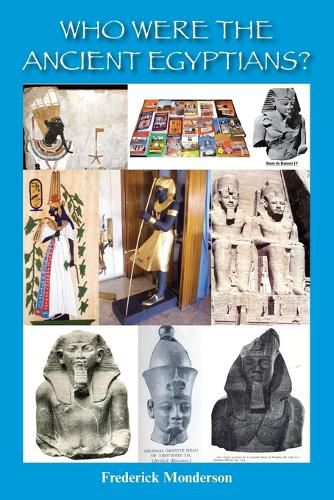Who Were the Ancient Egyptians?
Frederick Michael Monderson

Who Were the Ancient Egyptians?
Frederick Michael Monderson
WHO WERE THE ANCIENT EGYPTIANS? Omission and Distortion feature prominently in propagation of Ancient Egypt which begs the question Who were the Ancient Egyptians? That Ancient Egyptians were Caucasians who migrated from South-West Asia possessing a superior mental attitude, and ultimately formed a white ruling class lording it over a black lower class who did all the work is clearly incorrect. More correctly, Blacks initially called ANU founded cities as An, later Heliopolis of the Greeks and Romans, Erment and Esneh, etc. They laid the foundation for an emerging society, ultimately to later erect pyramids, raise obelisks, even construct temples and tombs. Such creativity helped Narmer in his conquest to establish a kingship system with state apparatus. He was able to craft theological and theosophic dynamics inherent in the religion that lasted throughout dynastic rule. A valid corrective then asks, Who actually possessed the ‘superior mental attitude?’ Clearly, the Caucasian Egypt falsity is ludicrous given The existential data contradicts the symbolic representation. In response to this prevailing falsity, ‘Who Were the Ancient Egyptians?’ is a small corrective to the provocative question, as supplied in hundreds of photographs, a substantial Bibliography and Index to enable young scholars crafting intellectual autonomy in their challenge to misinformation. Significantly, hardly a current text features the 4 figures in the Tomb of Rameses III. Contemporary maps picture the Nile River orientation and culture from north to south which makes west east and east west, forcing Dr. Diop to correct Edouard Naville, given, when East was East, West was not! Today, books on Western Civilization begin with a chapter on Ancient Egypt when previously such began with Greece and Rome. In the age of antiquity, Africans were marching along civilization’s illustrious paths, blazing a creative legacy through Kingship, religion, art and scientific experimentation, thereby enlightening the world. Conversely, practically every aspect of Europe’s distorted claim to Egypt has been speculative since we now know, the existential data contradicts the symbolic representation as it concurrently ignores Black African cultural effluence and presence emanating from inner Africa origins. The 19th Century French Egyptologist George Foucart in his article Egyptian king declared the earliest Egyptologists made mistakes in their interpretation of the evidence; in response Dr. Leonard James insisted the mistakes were deliberately implanted. These distortions contributed much to shaping the prevailing ingrained, yet false, view. Conversely, Cheikh Anta Diop in The African Origin of Civilization: Myth or Reality demolished the falsity of a Caucasian Egypt, of individuals migrating from South-West Asia and equally the Delta enlightenment origin argument, citing the major monuments and sites are in Upper not Lower Egypt. . To wit, Diop provided a mountain of modern and classical evidence to support his position the Egyptians were indigenous African, Black people. In Peopling of the Nile Valley, UNESCO in 1974 upheld Dr. Diop’s and Dr. Obenga’s well-researched presentations declaring, Egypt was an African and Black civilization. This Black Genesis occurred long before Caucasians supposedly migrated to Egypt from their place of origin on the Steppes of Eurasia. Today, statues forged in the Negro mold have their images defaced. Of note, the quintessential face of a Negro is centrally located within the nucleus of ritual representation and in theological hieroglyphic descriptions; still, not all noses are broken; even the mummies are shown with brown skin beneath the protective preservative black bitumen overlay; and the Great Sphinx, crafted long before much of this, has long sported Negro features. Fact is, the ancient Egyptians were Black not White, African and not Asiatic. So we must Defend Egypt as Bl
This item is not currently in-stock. It can be ordered online and is expected to ship in approx 2 weeks
Our stock data is updated periodically, and availability may change throughout the day for in-demand items. Please call the relevant shop for the most current stock information. Prices are subject to change without notice.
Sign in or become a Readings Member to add this title to a wishlist.


